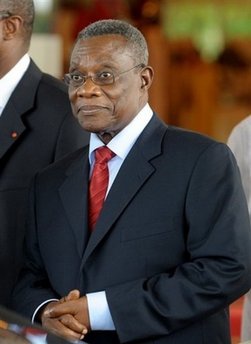One of the conditions the International Monetary Fund (IMF) is expected to impose on Ghana will be the need for leaner and prudent economic policies.
These prudent policies are what have been described by His Excellency Dr. Mohamed Ibn Chambas as a tested blueprint of the late President John Evans Atta Mills.
Delivering the second Annual John Evans Atta Mills Memorial Lecture in Accra, Dr. Chambas advised that “the Government of JDM revisits the tested blueprint of success employed by Atta Mills, in particular, the need for a leaner and performing government and prudent fiscal policies”.
Of the sound and prudent economic policies employed by the late President Mills, Dr. Chambas also revealed that even though the world at the time was in serious economic recession, “the careful and wise stewardship of President Mills’ macroeconomic fundamentals, including inflation and the exchange rate, were stabilised for the first time since the early nineties”
According to him, “Inflation came down to 8.4 from a high of 18.1 in December 2008. This is indicative of prudent fiscal, monetary and other austerity policy measures that characterized his presidency to put the economy in healthy shape. In 2011, Ghana set yet another record being the fastest growing economy in the world at 20.14 for the first half of the year and 14.4 at the end of the financial year, according to the International Monetary Fund”.
On budget deficit, he said, “Ghana’s budget deficit was reduced to 2% of the Gross Domestic Product during his tenure compared to 14.5% of GDP in 2008, just before he was elected as the President of Ghana. During Mills’ time in office, Ghana was adjudged the best place for doing business in West Africa and best West African performer in access to credit in 2011, according to the World Bank”.
His Excellency President John Dramani Mahama, upon a series of meetings and discussions with his (Presidential) Advisory Committee to find a lasting solution to the economic problems of Ghana among other things, directed that immediate initiatives be taken to open discussions with the IMF and other Development Partners in support of the nation’s programme so as to stabilize the growth of the country's economy.
The decision by the President that Ghana compares notes with the IMF for the way forward with regards to ensuring a more stable and resilient economy by adopting prudent policies, rightly fits into the late Mills’ blueprint of employing the appropriate fiscal, monetary and other austerity policy measures.
Though some opposition members in the NPP seem to disagree with the move to seek the IMF’s support, President Mahama, confident of the step taken, has in response stated that “the decision to open discussions with the International Monetary Fund (IMF) is not because of the failure of government’s own home-grown solutions, but rather because of the need for policy credibility and confidence from the international financial institutions, capital markets and investors for the measures being implemented to restore economic stability and growth”.
According to him, there will be no significant changes in Ghana’s domestic policy, despite the decision to join the Fund’s programme at the GE-Economist event recently, as part of the on-going U.S.-Africa Leaders Summit in Washington DC.
“So we are going to discuss with the IMF how we can turn the deficit around quickly and create the kind of confidence even in the short-term narrative,” he stressed.
He also hinted that subsidies on fuel and utilities will be taken off in addition to streamlining the spiraling public sector wages.
“We are working to improve revenue collection and efficiency in collecting taxes and also reforming the public financial management system,” the President disclosed.
In response to the gloomy picture painted about the Ghanaian economy, the President stated, “as much as we have tried to draw attention to Ghana’s potential, there is too much fixation with the short-term narrative; yes there has been a deficit and inflation has gone up; but we have put in measures to turn that around”, and was very optimistic that Ghana’s deficit will be brought under control by 2017.
In conclusion, the President hinted that Ghana “would, by end of August, sign a new deal with ENI concerning the country’s Sankofa field to explore more than a trillion cubic feet of gas in addition to 50,000 barrels of oil daily”, which to him, signals a good potential growth.
General News of Wednesday, 6 August 2014
Source: The Informer
Going for IMF bailout fits Atta Mills’ blueprint













